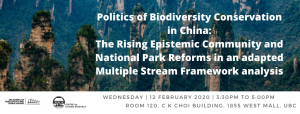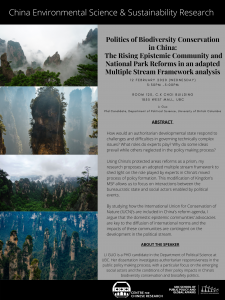China Environmental Science & Sustainability Research

Li Guo
PhD Candidate, Department of Political Science, University of British Columbia (UBC)
Politics of Biodiversity Conservation in China: The Rising Epistemic Community and National Park Reforms in an adapted Multiple Stream Framework analysis
How would an authoritarian developmental state respond to challenges and difficulties in governing technically complex issues, such as nature conservation systems? What roles do scientists and experts play? Why do some ideas prevail while others fall aside in the policy making process?
Using China’s past two decades of protected area reforms as a prism, my research proposes an adapted multiple stream framework to shed light on the role of experts and scientists in China’s mixed process of policy formation and decision making. This modification of Kingdon’s MSF allows us to bring in political regimes while focusing on social agency in the policy process; in particular, this adapted MSF allows us to focus on the dynamic interactions between the bureaucratic state and social actors enabled by political events.
By looking into how the IUCN’s ideas of national parks and protected areas are made into China’s reform agenda, I argue that the domestic epistemic community’s advocacy and contestation are key to the diffusion of international norms, and the impacts of the epistemic community are conditioned on the developments in the political stream.
ABOUT THE SPEAKER
LI GUO is a PHD candidate in the Department of Political Science at UBC. Her dissertation investigates authoritarian responsiveness in the public policy making process, with a particular focus on the emerging social actors and the conditions of their policy impacts in China’s biodiversity conservation and biosafety politics.
